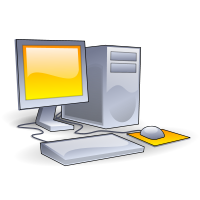 It’s hard to remember that it wasn’t that long ago that we only had a couple of choices to meet our computing needs. As recently as 2007, the year before Obama was elected, someone looking for a new computer basically could choose between a desktop or a laptop. In mobile, Research In Motion offered the Blackberry, which candidate Obama was famous for using — and still uses.
It’s hard to remember that it wasn’t that long ago that we only had a couple of choices to meet our computing needs. As recently as 2007, the year before Obama was elected, someone looking for a new computer basically could choose between a desktop or a laptop. In mobile, Research In Motion offered the Blackberry, which candidate Obama was famous for using — and still uses.
2007 was the year things began to change. In June of that year, Apple introduced the iPhone and in October Asus released the Eee PC, the first netbook of the modern era. When in October of the following year HTC released the Dream, the first handset running Android, it became obvious that consumer computing space had been forever changed. Less than two years later Apple released the iPad which was quickly followed by tablets running Android.
The introduction of the modern generation of tablets, which were highly capable and easy to use, had an immediate effect on sales of traditional desktops and laptops, leading some tech writers to proclaim that the age of the desktop was over and that desktop computers were on their way out. This wasn’t true, of course. We were just experiencing what the Wall Street types call a “market correction.”
For years it had been noted that many, if not most, home computer users didn’t really need a state of the art desktop, as most users basically used their computers for email, web surfing, listening to music and some word processing. Later, as streaming videos became popular after Google acquired YouTube, watching videos was added to the mix. Also, many home users didn’t really like full fledged computers, finding them to be too complicated. Tablets, with their ease of use and super portability, filled that gap nicely.
Early this month we wondered what devices the readers of FOSS Force were using. Since we cater to a tech savvy crowd, we already knew that you hadn’t abandoned the traditional PC en masse. But we also figured, tech lovers that you are, that you’d incorporated many of the devices into your lives.
On March 5 we published our How Do You Compute poll which asked the question, “What computing devices do you own?” Those taking the poll were allowed to choose all that applied from a field that included server, desktop, laptop or notebook, netbook, tablet, smartphone or “other.” The “other” options included a text box in which an explanation could be typed. In total, 275 of you took this poll.
| [yop_poll id=”35″] |
It was no surprise to discover that the traditional desktop and laptop were the winners here. The desktop led the pack with 226 votes. Laptops and notebooks were close behind with 219 votes. I think we can safely assume from this that close to 100% of those who took this poll own at least a desktop or a laptop, with a majority of you owning both. In third place, with 164 votes, was the smartphone followed by tablets with 122 votes.
We included servers into the mix because we knew that some of you would probably have an old box setup somewhere that you’re using as a file and print server. Also, many of you might be serving webpages from your home using a broadband connection. It was something of a surprise, however, to find that well over a third of those taking the poll, 109 to be exact, said they have a server.
Lagging far behind was the netbook, with only 79 of you ticking that answer. The “other” option picked-up 26 votes and included such things as embedded devices, eReaders and gaming consoles. Nine of you indicated that you own a Raspberry Pi.
A total of 945 answers were given, meaning you own, on average, 3.44 different types of computers.
Christine Hall has been a journalist since 1971. In 2001, she began writing a weekly consumer computer column and started covering Linux and FOSS in 2002 after making the switch to GNU/Linux. Follow her on Twitter: @BrideOfLinux







Seeing the mention of an eReader in the “Other” category set me thinking. I’m also the owner of an Amazon Kindle which I’m using daily, but I don’t think of it as a “computing device”. Still, it has a computer inside it which I believe is running some variant of Linux. Which is also the case with my router, and probably my DAB radio as well. These days, even washing machines can contain an embedded device which qualifies as a “computer”, although hardly anyone would talk about routers and washing machines as “computing devices”.
Maybe the term “computing device” is a little outdated. How many use eg. an iPad for actual computing? 🙂
I don’t see the desktop computer dying. Ever. Until maybe the distant future when there are thin glass like touch-surface devices that will be installed in houses and living quarters everywhere. But until then there will always be a desktop, and the only reason is that laptops can only do so much, and tablets are more for media consumption than for “power computing”. Until they can build a tablet or laptop that can run a server OS and perform the read/write operations at a good clip without overheating or causing any major malfunctions then desktops will remain the “standard” in most homes. I for one love desktops for their modularity, andability to be upgraded with just a few swap-outs…(motherboards….memory….graphics cards….fan…power supply etc.) its just a matter of finding the proper sized components that will fin inside your chassis….yep…desktops are gonna be around for a LONG time to come!
All my Computers are re purposed laptops (well one’s an old original series netbook).
Of the 5 currently in use, I purchased one of them , the others were given to me by friends or clients who no longer wanted them.
It would be interesting to see a follow up on those who voted as owning a server…
As you know, there are basically 2 types of servers when it comes to hardware — dedicated or non-dedicated. A “dedicated” server would be more of an appliance. And a good example of an appliance server might be something like a Drobo (http://www.drobo.com/storage-products/drobo/). So calling a Drobo a “computer” may technically be correct since it does have an OS, storage, etc. it might not be correct to call it a “computer” since it would be something of an undertaking to use a dedicated appliance like that as a computer.
However, when it comes to non-dedicated “servers” (hardware-wise) it’s a good bet that we’re really talking about something that could be used as a more traditional computer. Something running FreeNAS, Apache, (FTP), etc. is more likely to be a “computer” than it is an appliance.
Therefore, it would be my hope that anyone who said they had a server like a Drobo did not include it in the “server” category since dedicated appliances like that can not (easily) be used as full fledged computers. It would be more correct to include server “appliances” that in the other category. However, I doubt very many people saw it like this.